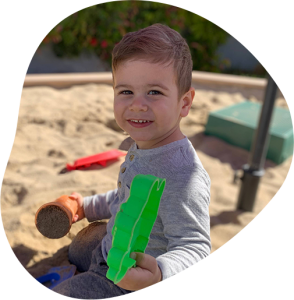Montessori Program
“Follow the child, but follow the child as his leader.”
Maria Montessori

Our curriculum supports children in choosing meaningful and challenging work at their own interest and ability level. This child-directed engagement strengthens motivation, supports attention, and encourages responsibility and independence. Uninterrupted periods of time allow children to work and play at their own pace and fully immerse themselves in an activity without interruption. Each child selects an activity, staying involved with that activity as long as he remains interested, cleaning up the activity and returning it to the shelf and making another choice of activity. Through this learning process each child develops coordination, concentration and self-regulation.
The Olam teachers carefully observe each child, identifying their interests and abilities and develop personalized learning activities for each child’s needs. They act as “guides” through the learning, introducing new lessons and levels of difficulty. The teacher encourages the child to enjoy this time to enhance their natural curiosities to learn, grow and succeed.
PRACTICAL LIFE
Practical life is the heart of the Montessori classroom. These are the first activities a child will be introduced to and they maintain their interest through the kindergarten year. Through these activities the new child integrates into the social and physical environment of the classroom, develops and refines fine and gross motor skills, learns to take care of herself and the environment, and explores crafts and arts. The older child will develop a sense of stewardship for the classroom and consciously help in its maintenance.
SENSORIAL
The Sensorial materials are designed to support children in refining their sense of vision, touch, smell and taste. They offer children the opportunity to explore these senses and identify the unique aspects of each sense in isolation. This precision supports the work they are doing in all other areas, but particularly Language and Mathematics.
LANGUAGE
Children begin their work with Language right away with Spoken Language. Poems, songs and verbal games build their vocabulary, and creative expression. Next, children will begin learning the sounds for letters and building their own words phonetically. With a strong base in writing, children will begin deciphering words and grow more confident in reading through the study of phonograms, puzzle words, grammar and comparative words.
MATHEMATICS
The Mathematics area offers children the experience of quantity which is then combined with language for a deep understanding of numbers. This experience builds as children learn to understand larger numbers, into the millions and and smaller numbers in fraction and begin work with the mathematical operations.
OUTDOOR EXPLORATIONS
Nature provides the ultimate sensory learning experiences. When children use their senses as they explore their world through sensory play, they are actively building nerve connections in the brain’s pathways, which is crucial to brain development. And, when we slow down, we can also see all the learning and social skills that are being developed through play in nature.
A child watching as an investigator, points out the moving clouds and the moon that is visible this morning. Suddenly a flock of birds flies overhead, which instigates a group of children to run around the play yard flapping their arms.
Creating environments that give our youngest learners the time, space, and opportunities to explore nature and the outdoor environment will provide meaningful learning experiences. We create engaging and wonder-filled environments that promote learning through their senses—auditory, visual, and tactile while playing in the dirt!
CULTURAL ACTIVITIES
Our cultural activities are integrated in our Jewish Montessori curriculum including geography, art, music science. Children learn about their heritage/community and the world around them. Discovering what is similar and different amongst people and environments helps them develop an understanding and appreciation of how diverse the world is and how to respect each other.
